#*personality
Text
601 notes
·
View notes
Text
1K notes
·
View notes
Text
674 notes
·
View notes
Text

Venturi Inc, 1969
#The Pipe#ad#1969#pipes#astrological signs#vintage#1960s#advertisement#pipe-smoking#personality#advertising#retro#60s style
495 notes
·
View notes
Text
It occurred to me recently that I've never shared the headcanons I had regarding Mario's strength in my version, so I thought I'd list them out in a single post for you guys.
Enjoy! :D
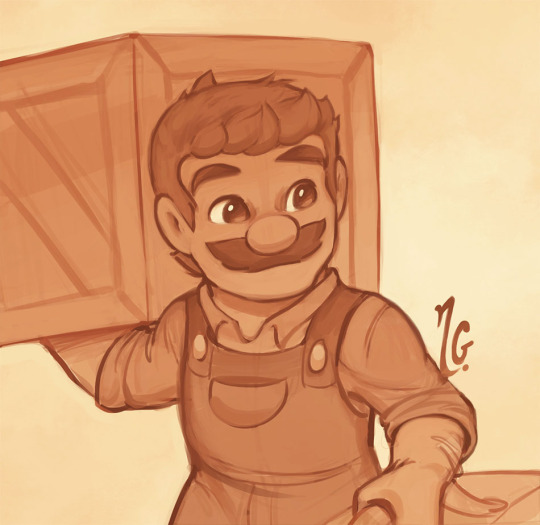
- Even without power-up, Mario is stronger and notably more resistant than average.
- This is mainly due to his high muscle density. He has a considerable body mass and is surprisingly heavy despite his short stature.
- He has a very healthy heart and incredible cardio. Sustained efforts that would leave others winded will affect him a lot less.
- His sturdiness gives him great equilibrium and stability, allowing him to keep his footing even on unsteady terrain.
- The man can lift objects up to five times his size and can pull tremendous loads across a short distance.
- He can carry the equivalent of a person's weight for long periods of time without feeling strained or tired.
- He makes labor look deceivingly easy to the point that others constantly underestimate how hard it truly is (and are always astounded when they try it for themselves, only to fail miserably).
- Mario doesn't workout outside of his daily tasks and activities. His job and naturally active disposition are his only form of exercise.
- He sometimes forgets how physically powerful he actually is, and has warped/broken quite a few things by accident.
- He is however extremely mindful of his capabilities when surrounded by others, and always significantly tempers himself when playing or interacting with friends.
- He never uses his strength to its full extent; both because he doesn't need to and because he fears causing harm otherwise.
- His intervention on a rampaging chain chomp was the greatest demonstration of brute force anyone had ever seen in the whole Kingdom. (See here for context)
- The exploit has made him famous among the guards and citizens alike, earning him the prestigious title of "Super" for the first time.
- While not typically one to show off, Mario loves entertaining people through various feats of athletic prowess.
- Out of all the things others seek his help for, he feels most useful when the favor requires either heavy lifting or manual expertise.
- Albeit very efficient when doing more dynamic chores, his prefered way of working is with his hands only.
- He can punch through almost any surface except literal stone and can bend even solid metal out of shape.
- A rush of adrenaline will cause his endurance to skyrocket, making him temporarily able to endure abject levels of pain and exhaustion.
- Despite those physical advantages, he values qualities of the mind and heart a lot more.
- When asked, Mario always says: "My brother and my friends give me strength. I owe them everything."
•°•°•
(There! Feel free to add your own if you have thoughts on those or feel inspired! ^-^)
#The best term I can use to describe how I picture Mario's strength in my AU is ''gentle and effortless'' 💞#He has a lot of muscle power - but it's soft and considerate just like him 😊#Mario#headcanon#personal portrayal#characterization#character traits#personality#physical abilities#Super Mario bros#fanart
436 notes
·
View notes
Text
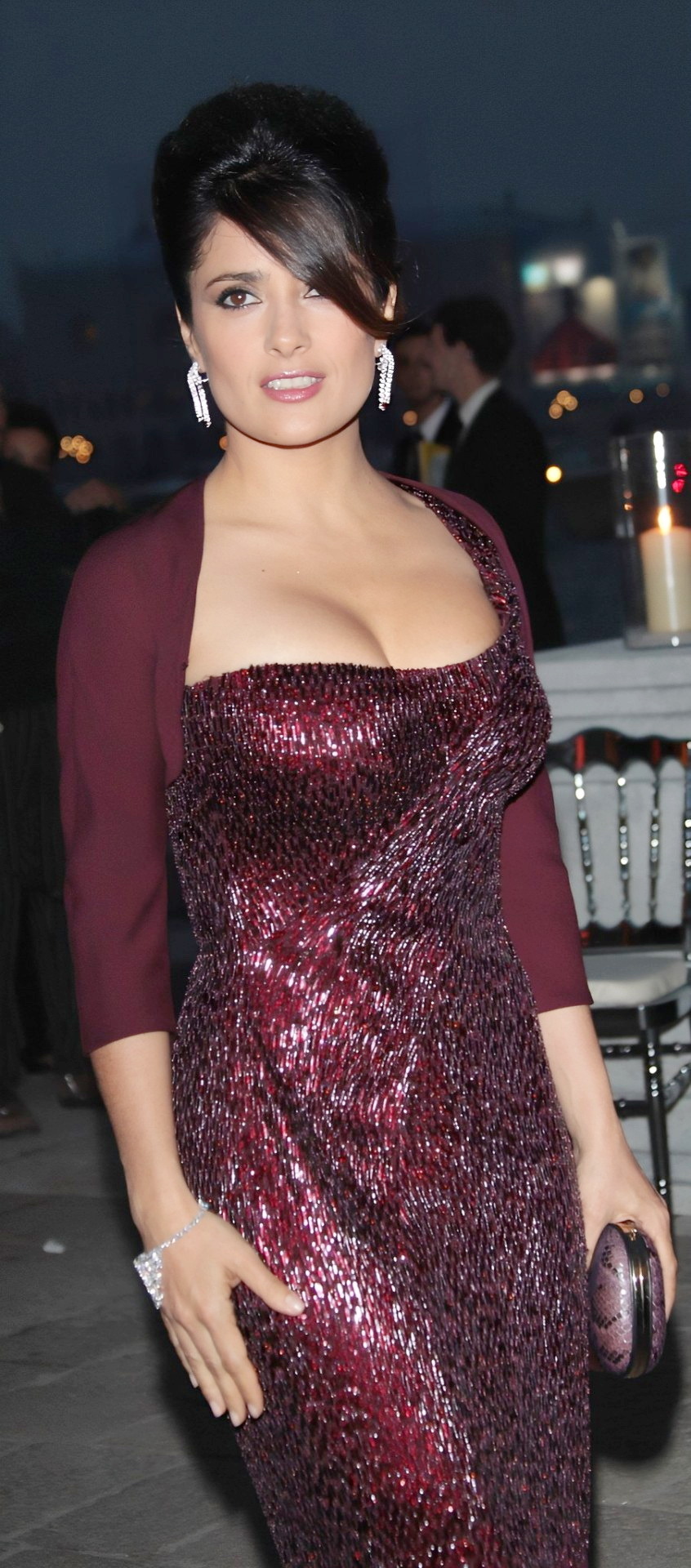
Salma Hayek
591 notes
·
View notes
Text
Are your characters too “perfect”? Struggling to give them negative traits?
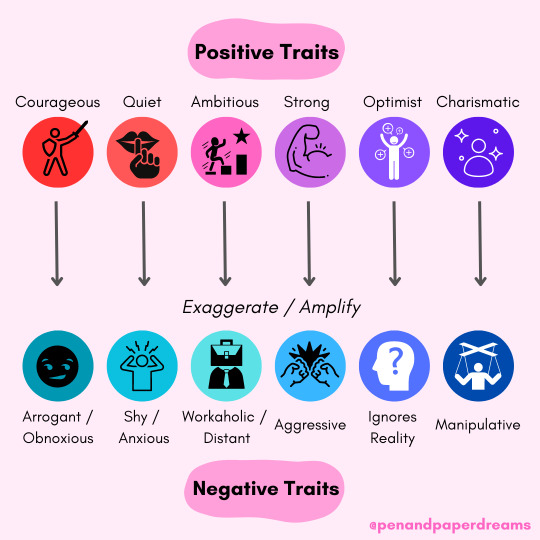
I’ve definitely fallen into the trap of making my protagonists and side characters too “perfect” before. It’s an easy mistake to make, but it can lead to your characters feeling one-dimensional if you’re too afraid to make them seem morally grey.
Here’s a very simple method:
1. Take a character’s main positive trait. Let’s take Hermione Granger, for example - her intelligence is a defining aspect of her character.
2. Exaggerate it into a negative trait. In the instance of Hermione Granger, she can come across to the other characters as a know-it-all. She’s not always portrayed as perfect for her intelligence, which is what makes her character more interesting.
Using this method, we have a number of options for negative traits for an intelligent character - patronising, arrogant, smug - to name a few.
I use the Fatal Attraction theory for this, which suggests that we fall out of love with someone for the same reason we were initially attracted to them. So, if you grew to like someone because you liked how strong and dominant they are, you may become tired of that down the line when their behaviour is controlling.
I’ve illustrated a few examples for how to exaggerate common positive traits into negative ones in the image above, but I have a few more examples to share so you really get the idea:
1. Comic relief / funny - can’t be serious, humour as a coping mechanism
2. Dark and mysterious - emotionally distant
3. Creative - aloof
4. Loyal - neglects own needs, willing to hurt for those they love
5. Compassionate / empathetic - overstepping boundaries
6. Honesty - overly blunt
7. Responsible - too serious
8. Humility - lack of self-belief
9. Trusting - easy to manipulate, overshares personal information
10. Perceptive - rude
11. Flirtatious - inappropriate
12. Organised - controlling, “neat freak”
13. Easygoing - lack of care about serious matters
14. Flamboyant - can be too much for some
15. Spontaneous - puts self in danger
Of course, you don’t have to do this. You can just have a character be spiritual and creative without making them out-of-touch and aloof. It’s completely up to you!
Using a method such as this, even if you only apply it subtly, adds a touch of realism to your writing by making your characters feel more well-rounded. It means that their negative aspects are truly coming from a part of them, rather than selected at random and mashed together from a list online.
#writing#writing tips#writing advice#character design#character building#character traits#characterisation#characterization#characters#personality#character personality#writingblr#novel#novel writing
723 notes
·
View notes
Text

Ana de Armas
𝐷𝑎𝑖𝑙𝑦 𝑀𝑜𝑚𝑒𝑛𝑡𝑠
590 notes
·
View notes
Text
how to write children's personalities
(this is part of my series, how to write children in fanfiction! feel free to check it out if you want more info like this!)
this is the main aspect of writing children that i see people mess up so often, especially in the fandoms i'm in (sanders sides and undertale). children are not adorable little noodles with no brains and no concept besides being cute and silly and crying. children are beings that are just as complex as adults, and they deserve personalities to match. this will make them way more interesting to read about! let's get started!
since there are so many aspects to personality to talk about and i don't want to sit here typing for ten years, we're going to do this guide a little differently. i'm going to divide these issues into archetypes, write a short description, and then make a list of do's and don't's for each one!
archetype one: the cute little baby
okay. babies are cute. we all know this, and i'm not saying it's a bad thing to make your babies cute. a lot of people love reading about moments with adorable little babies. but here are some ways to step this kind of thing up, and some things to avoid if you want to improve upon writing this archetype.
do's:
give the child character another archetype besides this one. though "cute" is the foundation for a lot of child characters, it's not a personality. and if a character is vital to your story, then it needs a personality. that's just a rule. you will read more about other archetypes further along in this post!
make the moments symbolic. though it doesn't seem like it from an outsider's perspective, basically everything a baby does is for a reason, and every action a baby makes can say something about their personality. if you want this baby's personality to be energetic and curious, have them crawl around and explore things, and laugh a lot, and babble. if you want this baby to be more sullen and shy, have them cry quietly instead of wailing, or have them squirm when being held by new people.
make the actions of the baby's guardians affect the mannerisms of the baby. babies act differently depending on how the people taking care of them act and react. for instance, if the baby's guardians are very busy people, then maybe have the baby cry very loudly whenever they want something, since they know that it's the only way to get the attention of their guardians. stuff like that can add depth to a character and to a general story.
don't's:
decide that the baby is cute and call it a day. sweet little babies are cool and all, but they get very boring to read about after a while. this can barely even be considered an archetype because of how bland it is when it's by itself.
keep this archetype around for too long. as babies turn into toddlers and then children, they don't act even remotely the same way. it's strange and off-putting to read about a seven year old acting like a two-year old, unless it's a very clear character choice that is a result of explicit actions and events.
make the baby know that it's cute. realistically, children don't understand the concept of cuteness until they're around toddler age. if then, you want to make the kid be like "i get what i want when i'm cute, so i'll act cute!", then sure, that's hilarious. but when they're two months old, they're not batting their eyelashes because that's their personality. they're batting their eyelashes because they got something in their eye. the main thing that makes a baby cute is that they don't know they're cute. they're just figuring out how to do ordinary things.
make everything a cute moment. while babies are awesome, raising them isn't always sunshine and rainbows. make the baby do something wildly chaotic, because babies do wildly chaotic things all the time. not only does this make things more realistic, but it makes things very interesting!
archetype two: the shy kid
as a former shy kid, i know good and well that these types of children exist, and they are very real and valid. however, there are certain ways i've seen them written that are just terrible because once again, this archetype cannot be considered a full personality on its own. let's get into the do's and don't's.
do's:
make their shyness a deliberate choice. kids aren't usually naturally shy. kids are usually more curious than cautious. is there a reason why the kid is shy? there doesn't have to be a reason why the kid is shy, but there could be a reason why the child is NOT outgoing/curious. try and give something like this some deliberate cause, instead of just making them shy so they can seem more precious and infantilized.
make their shyness manifest in diverse ways. not all shy kids cling to their guardian's leg and sit alone during recess. there are different ways to be shy. you can be aggressively shy, or fearfully shy, or shy due to general unwillingness to change.
make their shyness have realistic consequences. someone who's shy is probably not going to have many friends, if any. not all shy kids magically meet an extrovert who adopts them. someone who's shy probably has underdeveloped social skills, which can lead to them being less emotionally intelligent down the line. this makes the shy kid archetype a lot more three-dimensional than just a wet noodle of fear.
don't's:
infantilize shyness or treat it like it makes the kid some sweet, precious angel. not only is this very uncomfortable for shy people to read, but it's generally unrealistic. shyness doesn't affect how good or bad somebody is - it's a neutral trait.
use shyness as a tool to make characters seem younger. shyness does not indicate age. fear manifests in many different ways, and shyness is not the only way.
rely on cliches. not all shy people have the same journey, and the idea that a shy person becoming more outgoing is the "goal" is not only a bit offensive, but it's very cliche. shyness is not always an obstacle to be overcome.
archetype three: the happy-go-lucky kid
oftentimes, the reason why children characters are written into stories in the first place is to give a little bit of lightheartedness and innocence. to add a unique voice among all the cranky, stingy, burdened adults. but you have to be careful when writing this archetype. i personally really dislike this archetype as a whole, but i'm going to put personal feelings towards it aside because honestly, there's no valid reason to dislike it besides opinion.
do's:
give the kid a trademark. maybe this kid makes a lot of little jokes, or maybe they always see the best in a situation. give the kid one thing that makes them happy-go-lucky instead of just giving them everything because nobody is endlessly happy all the time in every way.
go deeper. while happiness is very often genuine, sometimes, it's a mask that hides something else. this can be an interesting way to sort of spice up your happy-go-lucky kid character. maybe the kid is hiding a big secret behind all those jokes.
don't's:
make the character always happy. while children tend to have simpler thoughts, they don't have simpler minds. this child needs to have thoughts, real, genuine thoughts that aren't just happy things.
see happy-go-lucky as a trait that is exclusive to children. comparing happiness to childhood and viewing them as the only places where the other can exist is just wrong, and it's kind of depressing. maybe give happy-go-lucky kid a happy-go-lucky adult to exchange jokes with!
---
those are the archetypes that i see a lot. but now, i'm going to suggest a few child character archetypes that i LOVE that i don't see enough in fics! feel free to use any of these that you like. alter them, combine them! these are, in my opinion, some of the most fun child character personalities!
the spoiled brat: "i want this, and that, and that, and- why aren't you giving it to me?? if you don't give me what i want, i'll tell on you!". spoiled brats are so fun to read and write about, especially when they have absolutely no reason to be spoiled given the current situation (think riches to rags). they've got everything, humor, angst, and best of all, lots of pockets for personality. think about why the child is spoiled. were they enabled by their guardians? did they grow up rich, with access to everything they wanted? think about whether you want the child to stay spoiled. does something change? do they learn how to improve their materialistic and selfish tendencies? there are so many opportunities to play with the personality of this child!
the know-it-all kid: while i do see a lot of know-it-all kids in media, oftentimes, they don't actually have personality besides bossiness and intelligence. i love know-it-all kids who have depth to them. kids who are constantly spouting information because of their sheer love to learn. kids who have one specific thing that they know everything about, so they never stop talking about it. kids who tell people what to do and act like they know best because they don't have a lot of control over anything at home, so they grasp at whatever control they can find elsewhere. i think this archetype could open up a lot of ideas for personality further down the line. it also has a lot of variety with humor and angst, and general depth.
the serious child: this is an archetype that i cannot get enough of. i love a child that doesn't think they're an adult, per se, and still enjoys kid things, but just has such a calm and regal air about them that isn't learned. it's just natural. think of the kid that doesn't really get excited about things conventionally, but you can tell they're happy by their faint smile. the kid that seems to live in slow motion, and doesn't mind this fact at all. the kid that sits alone at recess just because other kids scare the birds away, and they want to see how a bird acts when it doesn't think its being watched. i love kids who have poignant thoughts, because their thoughts are so creative and different from adult thoughts.
the adult-ified child: now this is another archetype i can't get enough of, but it's for a different reason. this child, on the other hand, does think that they're an adult for one reason or another. maybe their guardians forced them to grow up too quickly. maybe they just wanted to grow up quickly by themselves. but this child has thoughts that are too big for their little bodies. they explore things that aren't meant to be explored when their brains are still so small. they do everything too quickly, they stumble through life as if a clock is ticking somewhere. to me, they're just haunting to read about. it feels wrong and dangerous to just watch them do things that hurt them because they don't know any better, but they're on a page. nobody can stop them. it's just so tragic, i'm obsessed.
the prodigal child: this archetype isn't really as deep or detailed as the others, but i do appreciate it. this archetype is for a child who knew who they wanted to be from an early age. a child who wanders into a ballet class and finds out they're better than the ten year olds by the time they're five. this archetype often pairs really well with the know-it-all kid or the adult-ified child because usually, children don't experience what it's like to be the best at something until they're a lot older. this is just a really cool archetype when you aren't quite sure what to do with that main character's little sister.
the chaotic child: this archetype is so much fun to read and write, to be honest. this is a child that just does as they please, whether it's out of curiosity or for pure enjoyment. think of the crazy stories that your guardians have about you or your siblings being absolutely insane. scribbling in a book and then demanding that the library publish their version. trying to ride the dog like a horse. cutting up clothes in an attempt to be a fashion designer. this one is just plain fun!
---
now, there are so many more archetypes out there, but those are just my spotlights and recommendations! i hope after reading this, you feel more equipt to write child characters that have real, engaging, interesting personalities!
#not sanders sides#ez's writing#how to write children#how to write#writing#writing tips#writing guide#writing advice#writing resource#writing resources#personality#writing personality#do's and don't's#cliches#avoiding cliches#characterization#character concept#character tropes#character traits#character help
952 notes
·
View notes
Text
I might have spent an ungodly amount of time making a thing, but I promise it's worth it!
Share this far and wide, the larger the sample size the better!!!
(also if you take and reblog put it in the tags if I got your vibes right or not hehe)
#danny phantom#personality#personality quiz#danny fenton#sam manson#tucker foley#im not tagging them all#dp#this is a combo of psychology hannah and quiz-loving hannah
893 notes
·
View notes
Note
Why is N so level headed when they’re not the romanced one, but when they are romanced they aren’t as level headed? I noticed that N gets increasingly worried and reckless when they’re the one romanced
Because they have someone to lose. Obviously they don't want to lose anyone when not romanced!
But it's different when N suddenly realises just how much they feel for the MC and it TERRIFIES them on different levels, especially the idea of losing them.
Hope that helps! Thank you so much for the ask :)
426 notes
·
View notes
Text
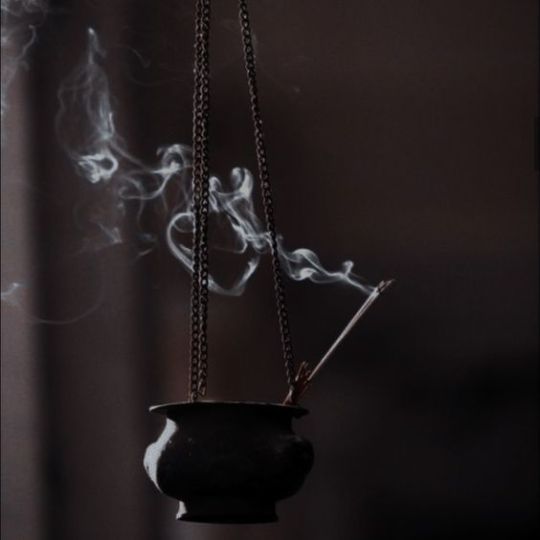

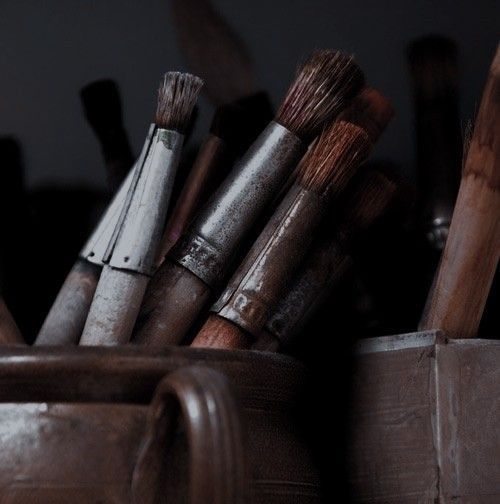
𝐌𝐁𝐓𝐈 𝐏𝐞𝐫𝐬𝐨𝐧𝐚𝐥𝐢𝐭𝐢𝐞𝐬 𝐄𝐱𝐩𝐥𝐚𝐢𝐧𝐞𝐝
Like I've done with the Hogwarts Houses, Moral Alignment, Tarot Cards and Zodiac (Sun, Moon, Rising); I am now creating a post for MBTI personalities! 16 all together, I've included some tests so if you don't know already, you can now!
Test One (from 16 Personalities, sort of the 'official' test, well the official free test. I think the real one you have to pay.)
Test Two (free don't worry)
Test Three (from truity)
There are sixteen different options that are split into four groups:
Analysts
Intuitive (N) and Thinking (T) personality types, known for their rationality, impartiality, and intellectual excellence.
Diplomats
Intuitive (N) and Feeling (F) personality types, known for their empathy, diplomatic skills, and passionate idealism.
Sentinels
Observant (S) and Judging (J) personality types, known for their practicality and focus on order, security, and stability.
Explorers
Observant (S) and Prospecting (P) personality types, known for their spontaneity, ingenuity, and flexibility.

Analysist: INTJ
𝑻𝒉𝒆 𝑴𝒂𝒔𝒕𝒆𝒓𝒎𝒊𝒏𝒅/𝑨𝒓𝒄𝒉𝒊𝒕𝒆𝒄𝒕
The acronym INTJ stands for introverted, intuitive, thinking, judging. ESFP is the opposite of the INTJ personality type. They're also known as: The Scientist, the Strategist.
𝐏𝐞𝐫𝐬𝐨𝐧𝐚𝐥𝐢𝐭𝐲:
One of the rarest personality types and one of the most capable
Rational and quick-witted
Not known for being warm and fuzzy. They tend to prioritize rationality and success over politeness and pleasantries
Architects question everything
Prefers to make their own discoveries
𝐓𝐫𝐚𝐢𝐭𝐬:
Independent
Introverted
Confident
Analytical
Driven
Ambitious
𝐂𝐡𝐚𝐫𝐚𝐜𝐭𝐞𝐫𝐬 𝐰𝐢𝐭𝐡 𝐭𝐡𝐢𝐬 𝐌𝐁𝐓𝐈:
Petyr Baelish
James Moriarty
Gandalf
Wednesday Addams
Walter White
Doctor Strange
Tywin Lannister
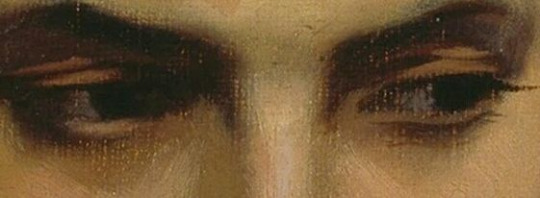
Analysist: INTP
𝑻𝒉𝒆 𝑳𝒐𝒈𝒊𝒄𝒊𝒂𝒏/𝑷𝒓𝒐𝒅𝒊𝒈𝒚
The INTP acronym stands for introverted, intuitive, thinking, perceiving. The opposite of an INTP is either an ESFJ or an ISFP. Also known as 'The Thinker.'
𝐏𝐞𝐫𝐬𝐨𝐧𝐚𝐥𝐢𝐭𝐲:
Can’t help but puzzle over the mysteries of the universe
Logicians aren’t afraid to stand out from the crowd
Often lose themselves in thought
They put a great deal of consideration into everything they do
Seem to live in a never ending daydream
𝐓𝐫𝐚𝐢𝐭𝐬:
Analytical
Imaginative
Curious
Radical thinking
Indepedent
Problem solvers
𝐂𝐡𝐚𝐫𝐚𝐜𝐭𝐞𝐫𝐬 𝐰𝐢𝐭𝐡 𝐭𝐡𝐢𝐬 𝐌𝐁𝐓𝐈:
Sherlock Holmes
Alice from Alice in Wonderland
Lord Varys
Bruce Banner
Arthur Weasley

Analysist: ENTJ
𝑻𝒉𝒆 𝑪𝒐𝒎𝒎𝒂𝒏𝒅𝒆𝒓
It stands for extraverted, intuitive, thinking, judging. ISFP is the opposite personality type of ENTJ. Sometimes referred to as the 'CEO'.
𝐏𝐞𝐫𝐬𝐨𝐧𝐚𝐥𝐢𝐭𝐲:
Ability to set long-range goals and implement them in an organized manner
They love a good challenge, whether it's big or small
Tend to avoid displays of any type of emotion, so they may be perceived as cold.
They firmly believe that given enough time and resources, they can achieve any goal.
At the negotiating table, be it in a corporate environment or buying a car, Commanders are dominant, relentless, and unforgiving.
𝐓𝐫𝐚𝐢𝐭𝐬:
Natural born leader
Charismatic
Direct
Organised
Self-assured
Stubborn
Dominant
𝐂𝐡𝐚𝐫𝐚𝐜𝐭𝐞𝐫𝐬 𝐰𝐢𝐭𝐡 𝐭𝐡𝐢𝐬 𝐌𝐁𝐓𝐈:
Thomas Shelby
Tony Soprano
Cersei Lannister
Beth Dutton
Milady de Winter
Raymond Reddington
Lyanna Mormont

Analysist: ENTP
𝑻𝒉𝒆 𝑫𝒆𝒃𝒂𝒕𝒆𝒓
It stands for extroverted, intuitive, thinking and perceiving. ISFJs and ENTPs are two Myers-Briggs personality types that share the same cognitive functions, but in reverse order. Also known as ' the Innovator,' 'the Visionary'.
𝐏𝐞𝐫𝐬𝐨𝐧𝐚𝐥𝐢𝐭𝐲:
It would be a mistake, though, to think of Debaters as disagreeable or mean-spirited. Instead, people with this personality type are knowledgeable and curious, with a playful sense of humor
No belief is too sacred to be questioned, no idea is too fundamental to be scrutinized, and no rule is too important to be broken
As Debaters see it, most people are too ready to do as they’re told and blindly conform to social norms
They tend to be bold and creative, deconstructing and rebuilding ideas with great mental agility. They pursue their goals vigorously despite any resistance they might encounter.
𝐓𝐫𝐚𝐢𝐭𝐬:
Quick-witted
Audacious
Rebellious
Outspoken
Puts self first
Charming
Unpredictable
𝐂𝐡𝐚𝐫𝐚𝐜𝐭𝐞𝐫𝐬 𝐰𝐢𝐭𝐡 𝐭𝐡𝐢𝐬 𝐌𝐁𝐓𝐈:
Captain Jack Sparrow
Tyrion Lannister
Willy Wonka
The Joker
Irene Adler
Fleabag
Alfie Solomons

Diplomat: INFJ
𝑻𝒉𝒆 𝑨𝒅𝒗𝒐𝒄𝒂𝒕𝒆/𝑴𝒚𝒔𝒕𝒊𝒄
Is someone with the introverted, intuitive, feeling, and judging personality traits. The opposite to INFJ is the INFP, who will appear less organized and less controlled than the INFJ to others.
𝐏𝐞𝐫𝐬𝐨𝐧𝐚𝐥𝐢𝐭𝐲:
They tend to approach life with deep thoughtfulness and imagination.
Their inner vision, personal values, and a quiet, principled version of humanism guide them in all things.
People with this personality type care about integrity, and they’re rarely satisfied until they’ve done what they know to be right.
Advocates tend to carry around a sense – whether conscious or not – of being different from most people.
𝐓𝐫𝐚𝐢𝐭𝐬:
Insightful
Idealistic
Principled
Wise
Moral
Compassionate
Understanding
Passionate
𝐂𝐡𝐚𝐫𝐚𝐜𝐭𝐞𝐫𝐬 𝐰𝐢𝐭𝐡 𝐭𝐡𝐢𝐬 𝐌𝐁𝐓𝐈:
Remus Lupin
Elsa
Obi-Wan Kenobi
Jane Eyre
Elizabeth Bennet
Loki
Galadriel
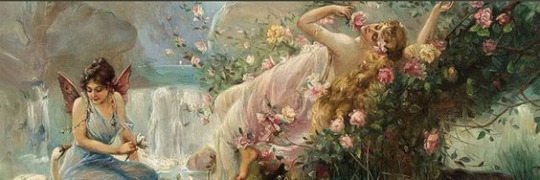
Diplomat: INFP
𝑻𝒉𝒆 𝑴𝒆𝒅𝒊𝒂𝒕𝒐𝒓/𝑫𝒓𝒆𝒂𝒎𝒆𝒓
Is someone who possesses the introverted, intuitive, feeling, and prospecting personality traits. ESTJ is the opposite personality type of INFP. Also known as 'the Idealist,' 'the Healer.'
𝐏𝐞𝐫𝐬𝐨𝐧𝐚𝐥𝐢𝐭𝐲:
These rare personality types tend to be quiet, open-minded, and imaginative, and they apply a caring and creative approach to everything they do.
Although they may seem quiet or unassuming, INFPs have vibrant, passionate inner lives.
Happily lose themselves in daydreams
Known for their sensitivity; they can have profound emotional responses to music, art, nature, and the people around them.
Long for deep, soulful relationships
Mediators have a talent for self-expression. They may reveal their innermost thoughts and secrets through metaphors and fictional characters.
𝐓𝐫𝐚𝐢𝐭𝐬:
Introspective
Intuitive
Empathetic
Flexible
Idealistic
Curious
Creative
Strong Personal Values
𝐂𝐡𝐚𝐫𝐚𝐜𝐭𝐞𝐫𝐬 𝐰𝐢𝐭𝐡 𝐭𝐡𝐢𝐬 𝐌𝐁𝐓𝐈:
Lucy Pevensie
Frodo Baggins
Tina Belcher
Newt Scammander
Wanda Maximoff
Luna Lovegood
Edward Scissorhands

Diplomat: ENFJ
𝑻𝒉𝒆 𝑷𝒓𝒐𝒕𝒂𝒈𝒐𝒏𝒊𝒔𝒕/𝑴𝒆𝒏𝒕𝒐𝒓
ENFJ is extraverted, intuitive, feeling, and judging personality traits. ISTP is the opposite of the ENFJ personality type. Also known as, 'the Giver,' 'the Teacher.'
𝐏𝐞𝐫𝐬𝐨𝐧𝐚𝐥𝐢𝐭𝐲:
They're born leaders, with passion and charisma which makes them great politicians, coaches, and teachers.
These warm, forthright types love helping others, and they tend to have strong ideas and values.
They back their perspective with the creative energy to achieve their goals.
Feel called to serve a greater purpose in life
When something strikes them as unjust or wrong, they speak up
These personality types have the ability to pick up on people’s underlying motivations and beliefs
ENFJ’s secret weapon is their purity of intent
They're motivated by a sincere wish to do the right thing
𝐓𝐫𝐚𝐢𝐭𝐬:
Very extraverted
Great people skills
Warm
Affectionate
Supportive
Great at encouraging others
Thoughtful
Gentle
Kind
𝐂𝐡𝐚𝐫𝐚𝐜𝐭𝐞𝐫𝐬 𝐰𝐢𝐭𝐡 𝐭𝐡𝐢𝐬 𝐌𝐁𝐓𝐈:
Margaery Tyrell
Queenie Goldstein
Professor X
Mufasa
Diana Prince / Wonder Woman
Peeta Mellark
Elle Woods
Moana

Diplomat: ENFP
𝑻𝒉𝒆 𝑪𝒂𝒎𝒑𝒂𝒊𝒈𝒏𝒆𝒓
ENFP stands for extraverted, intuitive, feeling, and prospecting personality traits. ISTJ is the opposite personality type of ENFP. ENFPs are also called the Campaigners or the Encouragers mainly because of their desire to inspire and encourage other people. Also known as, 'the Champion,' 'the Visionary.'
𝐏𝐞𝐫𝐬𝐨𝐧𝐚𝐥𝐢𝐭𝐲:
These people tend to embrace big ideas and actions that reflect their sense of hope and goodwill toward others.
Their vibrant energy can flow in many directions.
Are true free spirits – outgoing, openhearted, and open-minded.
They can’t help but ponder the deeper meaning and significance of life – even when they should be paying attention to something else.
These people radiate a positive energy that draws in other people
Few things matter more to these personality types than having genuine, heartfelt conversations with the people they cherish
𝐓𝐫𝐚𝐢𝐭𝐬:
Free-spirited
Optimistic
Idealistic
Open-minded
Curious
Authentic
Inspiring
Intuitive
Imaginative
𝐂𝐡𝐚𝐫𝐚𝐜𝐭𝐞𝐫𝐬 𝐰𝐢𝐭𝐡 𝐭𝐡𝐢𝐬 𝐌𝐁𝐓𝐈:
Ariel
Anne of Green Gables
John Keating
Wizard Howl
Jo March
Michael Scott
Peter Parker/Spiderman
Phil Dunphy

Sentinel: ISTJ
𝑻𝒉𝒆 𝑳𝒐𝒈𝒊𝒔𝒕𝒊𝒄𝒊𝒂𝒏/𝑫𝒆𝒕𝒆𝒄𝒕𝒊𝒗𝒆
ISTJ stands for introverted, observant, thinking, and judging personality traits. ENFP is the opposite personality type of ISTJ. Also known as 'Duty-Fulfillers'.
𝐏𝐞𝐫𝐬𝐨𝐧𝐚𝐥𝐢𝐭𝐲:
These people tend to be reserved yet willful, with a rational outlook on life.
They compose their actions carefully and carry them out with methodical purpose.
ISTJs pride themselves on their integrity
Aren’t known for expressing their emotions readily
They strive to meet their obligations no matter what
ISTJs might unfairly misjudge people who can’t match their rigorous self-control – suspecting that someone is being lazy or dishonest when that person might actually be coping with other challenges.
𝐓𝐫𝐚𝐢𝐭𝐬:
Decisive
Focused
Efficient
Reserved yet willful
Loyal
Blunt
Factual
Logical
Meticulous
𝐂𝐡𝐚𝐫𝐚𝐜𝐭𝐞𝐫𝐬 𝐰𝐢𝐭𝐡 𝐭𝐡𝐢𝐬 𝐌𝐁𝐓𝐈:
Hermione Granger
Thorin Oakinshield
Nedd Stark
Rick Grimes
Brienne of Tarth
Jim Hopper
Ron Swanson

Sentinel: ISFJ
𝑻𝒉𝒆 𝑫𝒆𝒇𝒆𝒏𝒅𝒆𝒓
ISFJ stands for introverted, observant, feeling, and judging personality traits. The ENTP personality type is the opposite ISFJs. Also known as 'the Protector,' 'the Nurturer.'
𝐏𝐞𝐫𝐬𝐨𝐧𝐚𝐥𝐢𝐭𝐲:
These people tend to be warm and unassuming in their own steady way.
They’re efficient and responsible, giving careful attention to practical details in their daily lives.
In their unassuming, understated way, Defenders help make the world go round.
They invest a great deal of energy into maintaining strong connections with their loved ones
Known for dropping everything and lending a hand whenever a friend or family member is going through a hard time.
Defenders’ sense of loyalty doesn’t stop with their nearest and dearest – it often extends to their communities, their employers, and even family traditions.
For ISFJs, “good enough” is rarely good enough. People with this personality type can be meticulous to the point of perfectionism.
𝐓𝐫𝐚𝐢𝐭𝐬:
Warm-hearted
Responsible
Sensitive
Reliable
Caring
Will do anything for those they care about
Generous
Defenders tend to underplay their accomplishments but they eventually become resentful toward the people who just don’t seem to appreciate them.
Excellent analytical abilities and an eye for detail
𝐂𝐡𝐚𝐫𝐚𝐜𝐭𝐞𝐫𝐬 𝐰𝐢𝐭𝐡 𝐭𝐡𝐢𝐬 𝐌𝐁𝐓𝐈:
Steve Rogers/ Captain America
Jennifer Honey (Miss Honey from Matilda)
Beth March
Charlie Buckets
Samwise Gamgee
Dr Watson
Will Turner

Sentinel: ESTJ
𝑻𝒉𝒆 𝑬𝒙𝒆𝒄𝒖𝒕𝒊𝒗𝒆/𝑪𝒂𝒑𝒕𝒂𝒊𝒏
ESTJ stands for extraverted, observant, thinking, and judging personality traits. INFP is the opposite personality type of ESTJ. Also known as 'the Supervisor,' 'the Composer.'
𝐏𝐞𝐫𝐬𝐨𝐧𝐚𝐥𝐢𝐭𝐲:
They possess great fortitude, emphatically following their own sensible judgment.
They often serve as a stabilizing force among others, able to offer solid direction amid adversity.
ESTJs feel most comfortable when there are established procedures in place
Taking pride in bringing people together
The main challenge for Executives is to recognize that not everyone follows the same path
Executives are classic images of the model citizen: they help their neighbors, uphold the law, and try to make sure that everyone participates in the communities and organizations they hold so dear.
𝐓𝐫𝐚𝐢𝐭𝐬:
Productive
Task-Orientated
Pragmatic
Enjoy order and structure in life
Focuses on facts and details rather than ideas and concepts
Confident
Natural leaders and have a strong work ethic
𝐂𝐡𝐚𝐫𝐚𝐜𝐭𝐞𝐫𝐬 𝐰𝐢𝐭𝐡 𝐭𝐡𝐢𝐬 𝐌𝐁𝐓𝐈:
Mary Poppins
Peter Pevensie
Borormir
Monica Gellar
Hector Barboss
Claire Dunphy
Miranda Bailey
Mycroft Holmes

Sentinel: ESFJ
𝑻𝒉𝒆 𝑪𝒐𝒏𝒔𝒖𝒍
ESFJ stands for extraverted, observant, feeling, and judging personality traits. ISTP is the opposite personality type to ESFJs because they often struggle to be practical. Also known as, 'the Caregiver,' 'the Host.'
𝐏𝐞𝐫𝐬𝐨𝐧𝐚𝐥𝐢𝐭𝐲:
They are attentive and people-focused, and they enjoy taking part in their social community.
Their achievements are guided by decisive values, and they willingly offer guidance to others.
Energized by time spent with others
Consuls do believe in the power of hospitality and good manners, and they tend to feel a sense of duty to those around them
Consuls have a talent for making the people in their lives feel supported, cared for, and secure.
They believe that there is a clear right thing to do in nearly every situation
ESFJs have a clear moral compass
𝐓𝐫𝐚𝐢𝐭𝐬:
Attentive
People-focused
Generous
Reliable
Tender-hearted
Organised
Focused
Strong sense of duty
𝐂𝐡𝐚𝐫𝐚𝐜𝐭𝐞𝐫𝐬 𝐰𝐢𝐭𝐡 𝐭𝐡𝐢𝐬 𝐌𝐁𝐓𝐈:
Anna Smith
Molly Weasley
Bilbo Baggins
Effie Trinket
Sansa Stark
Cher Horowitz
Nala
Leslie Knope
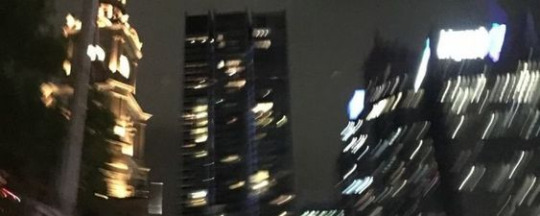
Explorer: ISTP
𝑻𝒉𝒆 𝑽𝒊𝒓𝒕𝒖𝒐𝒔𝒐
ISTP stands for introverted, observant, thinking, and prospecting personality traits. ENFJ is the opposite of the ISTP personality type. Also known as, 'the Vigilante,' 'the Crafter,' 'the Analyser,' 'the Artisan.'
𝐏𝐞𝐫𝐬𝐨𝐧𝐚𝐥𝐢𝐭𝐲:
They tend to have an individualistic mindset, pursuing goals without needing much external connection.
They engage in life with inquisitiveness and personal skill, varying their approach as needed.
Virtuosos love to explore with their hands and their eyes, touching and examining the world around them with cool rationalism and spirited curiosity.
Energized by time spent alone
Virtuosos are likely to go too far, accepting likewise retaliation, good or bad, as fair play.
Act too soon
They’ll be the first to tell an insensitive joke, get overly involved in someone else’s project, roughhouse and play around, or suddenly change their plans because something more interesting came up.
𝐓𝐫𝐚𝐢𝐭𝐬:
Individualistic mindset
Logical
Loves action and new experiences
Logical but adaptable
Enigmatic
A lot of impulsive energy
Have a “do unto others” attitude
Self-sufficient
Tough
Independent
𝐂𝐡𝐚𝐫𝐚𝐜𝐭𝐞𝐫𝐬 𝐰𝐢𝐭𝐡 𝐭𝐡𝐢𝐬 𝐌𝐁𝐓𝐈:
Arya Stark
Jason Bourne
Jessica Jones
Jace Herondale
Indiana Jones
Rosa Diaz
Rue Bennett
John Wick
Wolverine

Explorer: ISFP
𝑻𝒉𝒆 𝑨𝒅𝒗𝒆𝒏𝒕𝒖𝒓𝒆𝒓
ISFP means introverted, observant, feeling, and prospecting personality traits. ISFP is the opposite of ENTJ: the commander, who is upfront outgoing and demanding. ISFP is quiet and unassuming. Also known as, 'the Artist, 'the Composer.'
𝐏𝐞𝐫𝐬𝐨𝐧𝐚𝐥𝐢𝐭𝐲:
They tend to have open minds, approaching life, new experiences, and people with grounded warmth.
Their ability to stay in the moment helps them uncover exciting potentials.
Adventurers tend to see themselves as “just doing their own thing,” so they may not even realize how remarkable they really are.
Quiet and reserved, people with this personality type are keen observers; they enjoy the moment and what’s happening around them.
Embrace a flexible, adaptable approach to life.
Remarkably tolerant and open-minded.
𝐓𝐫𝐚𝐢𝐭𝐬:
Gentle
Compassionate
Tend to live in the here and now
Love to be active
And love interacting with others
Carefree
Playful
Spontaneous
𝐂𝐡𝐚𝐫𝐚𝐜𝐭𝐞𝐫𝐬 𝐰𝐢𝐭𝐡 𝐭𝐡𝐢𝐬 𝐌𝐁𝐓𝐈:
Claire Fraser
Eowyn
Bella Swan
Jon Snow
Cinna
Zuko
Cedric Diggory

Explorer: ESFP
𝑻𝒉𝒆 𝑬𝒏𝒕𝒆𝒓𝒕𝒂𝒊𝒏𝒆𝒓
ESFP stands for extraverted, observant, feeling, and prospecting personality traits. INTJ is the opposite personality type of ESFP. People with this personality type tend to be outgoing, friendly, and impulsive, acquiring the most enjoyment from being in the presence of others. Also known as, 'the Performer.'
𝐏𝐞𝐫𝐬𝐨𝐧𝐚𝐥𝐢𝐭𝐲:
These people love vibrant experiences, engaging in life eagerly and taking pleasure in discovering the unknown.
They can be very social, often encouraging others into shared activities.
These people love vibrant experiences
ESFPs get caught up in the excitement of the moment, and want everyone else to feel that way, too.
No other personality type is as generous with their time and energy as Entertainers when it comes to encouraging others, and no other personality type does it with such irresistible style.
Many famous people with the Entertainer personality type are indeed actors
There’s no greater joy for them than just having fun with a good group of friends.
Have the strongest aesthetic sense of any personality type; an eye for fashion.
𝐓𝐫𝐚𝐢𝐭𝐬:
Spontaneous
Humorous
Comedic-relief
Thoughtful
Well-liked
Resourceful
Outgoing
Friendly
Love the spotlight
𝐂𝐡𝐚𝐫𝐚𝐜𝐭𝐞𝐫𝐬 𝐰𝐢𝐭𝐡 𝐭𝐡𝐢𝐬 𝐌𝐁𝐓𝐈:
Steve Harrington
Jesper Fahey
Arthur Shelby
Rose Tyler
Jesse Pinkman
Andy Bernard

Explorer: ESTP
𝑻𝒉𝒆 𝑬𝒏𝒕𝒓𝒆𝒑𝒓𝒆𝒏𝒆𝒖𝒓/𝑫𝒂𝒓𝒆𝒅𝒆𝒗𝒊𝒍
ESTP stands for extraverted, observant, thinking, and prospecting personality traits. INFJ is the opposite personality type of ESTP. Also known as, 'the Doer,' 'the Action-Seeker,' 'the Persuader.'
𝐏𝐞𝐫𝐬𝐨𝐧𝐚𝐥𝐢𝐭𝐲:
They tend to be energetic and action-oriented, deftly navigating whatever is in front of them.
They love uncovering life’s opportunities, whether socializing with others or in more personal pursuits.
They love using common sense to find smarter ways of doing things.
While they are dedicated to whatever they're working on, they don't like to be micromanaged or told what to do by others.
They thrive by being the center of attention.
Always have an impact on their immediate surroundings
If an audience member is asked to come on stage, Entrepreneurs volunteer
They have a special ability to react quickly in an emergency or crisis situation.
𝐓𝐫𝐚𝐢𝐭𝐬:
Adventurous
Thrill-seeking
Energetic
Outgoing
Charismatic
Persuasive
Live in a world of action
𝐂𝐡𝐚𝐫𝐚𝐜𝐭𝐞𝐫𝐬 𝐰𝐢𝐭𝐡 𝐭𝐡𝐢𝐬 𝐌𝐁𝐓𝐈:
Rebecca Sharp
Jaime Lannister
Aquaman
Gimli
Sirius Black
Han Solo
Jennifer Check
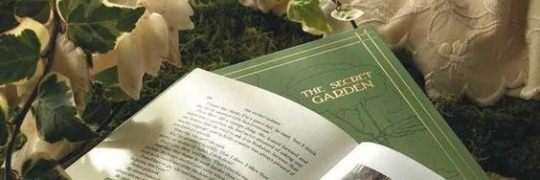
𝑻𝒊𝒑𝒔 𝒐𝒏 𝒉𝒐𝒘 𝒕𝒉𝒆 𝒍𝒆𝒕𝒕𝒆𝒓𝒔 𝒘𝒐𝒓𝒌:
Extraversion (E) – Introversion (I)
Extraverts (also often spelled extroverts) are "outward-turning" and tend to be action-oriented, enjoy more frequent social interaction, and feel energized after spending time with other people. Introverts are "inward-turning" and tend to be thought-oriented, enjoy deep and meaningful social interactions, and feel recharged after spending time alone.
Sensing (S) – Intuition (N)
People who prefer sensing tend to pay a great deal of attention to reality, particularly to what they can learn from their own senses. They tend to focus on facts and details and enjoy getting hands-on experience. Those who prefer intuition pay more attention to things like patterns and impressions. They enjoy thinking about possibilities, imagining the future, and abstract theories.
Thinking (T) – Feeling (F)
This scale focuses on how people make decisions based on the information that they gathered from their sensing or intuition functions. People who prefer thinking place a greater emphasis on facts and objective data.
Judging (J) – Perceiving (P)
The final scale involves how people tend to deal with the outside world. Those who lean toward judging prefer structure and firm decisions. People who lean toward perceiving are more open, flexible, and adaptable. These two tendencies interact with the other scales.
#witchthewriter#mbti#personality#personalities#mbti personality types#mbti stuff#mbti types#mbti personalities#personality types#entj#enfp#intp#esfj#intj#infp#witch the writer's lessons#witch's lessons#personalities explained#infj#enfj#istp#entp#istj#estj#esfp#estp#outgoing#introverted#ambiverted#quiet
955 notes
·
View notes
Quote
There is no objective reality... there is only an illusion of consciousness, there is only an objectification of reality, which was created by the spirit. The origin of life is creativity, freedom; and the personality, subject, and spirit are the representatives of that origin, but not the nature, not the object.
Nikolai Berdyaev, Dream and Reality
#philosophy#quotes#Nikolai Berdyaev#Dream and Reality#objectivity#reality#consciousness#subjectivity#creativity#freedom#personality#spirit
157 notes
·
View notes
Text
What I'd really like is for someone to objectively watch me for a week or so. And then just sit down with me for a few hours and explain to me what I am like, and how I look to others and what my personality is in detail and how I need to improve. Where do I sign up for that?
#someone#romantic academia#personality#literature#dark academia#art#love#vintage aesthetic#illustration#poetry#tumblr writers#chaotic academism#escapism#spilled ink#light academia#txt post#writers and lovers#love quotes#writeblr#writers on tumblr#liesandnights#life quotes#academia#random rant
317 notes
·
View notes

